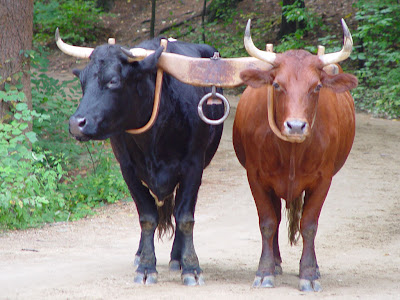Hiding an Ox

“Nice play, ox!” is the friendly gibe that we used to direct at a buddy during a sporting event when he missed an easy layup or dropped a hot line drive. The memory of that phrase set me to thinking about words that conceal an ox. [Don’t ask; it’s what I do.]
First of all, there’s Bucephalus, the famed horse of Alexander the Great. Legend has it that King Philip, Alexander’s father, was about to turn down the offer of a horse because no one could tame it. The pre-teen Alexander asked for a shot at it and succeeded where grown men had failed. The horse was his. The steed must have been as big as a Clydesdale, because the name Bucephalus comes from the Greek bous, ox, and kephale, head. Hi, Ho, Ox Head!
The mind is capable of many strange aberrations, but one of the weirdest that I've encountered is called boanthropy. This is a mental illness in which a man believes himself to be an ox. The word is an amalgam of bous, ox, and anthropos, man. Grab your bible and turn to Daniel iv. 33. There you’ll find this: “The same hour was the thing fulfilled upon Nebuchadnezzar: and he was driven from men, and did eat grass as oxen, and his body was wet with the dew of heaven, till his hairs were grown like eagles' feathers, and his nails like birds' claws.”
An ancient style of writing was called boustrophodon. It involved writing from right to left, then dropping to the next line and writing from left to right. The writer would keep alternating directions for each line. The action was just like plowing a field with oxen: when you reached the end of the furrow, you reversed direction. Boustrophedon came from bous, ox, and strophes, turning.
Bulimia is an emotional eating disorder. It features bouts of extreme overeating alternating with self-induced vomiting, purging, or fasting. Active athletes may have the appetite of an ox, but it’s totally inappropriate and harmful when it’s the product of fixation with body image. The word bulimia comes from bous, ox, and limos, hunger.
Buphthalmos is the name given to a form of infantile glaucoma. The most noticeable symptom is gross enlargement of the eyeball owing to increased intra-ocular pressure. The word comes from bous, ox, and ophthalmos, eye.
So, you see, hiding an ox is easier than catering to an 800 pound gorilla.
SIDEBAR: Public demonstrations of oxen at work


Comments